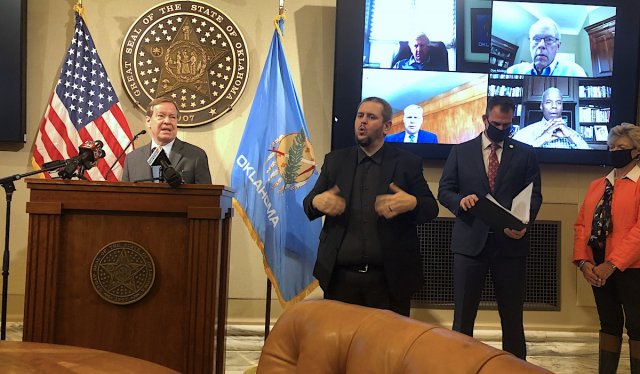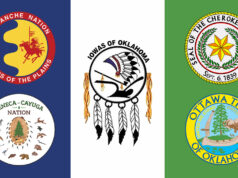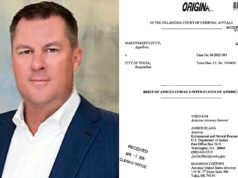
Oklahoma Gov. Kevin Stitt’s Commission on Cooperative Sovereignty released its preliminary report about how to address the civil and criminal legal uncertainties following court decisions that have affirmed about 40 percent of the state is composed of Indian reservations.
“Over 1.8 million non-tribal members call eastern Oklahoma home,” Stitt said. “That makes Oklahoma unlike any other reservation that exists in the entire country.”
Stitt formed his commission and appointed Devon Energy Chairman Emeritus Larry Nichols to lead it in July, days after the U.S. Supreme Court overturned the conviction of child molester Jimcy McGirt by affirming that Wagoner County had no authority prosecute him because his crime had been committed in the Muscogee (Creek) Nation, which Congress had never disestablished.
That meant only federal and tribal jurisdictions have authority to prosecute tribal citizens who commit crimes under the Major Crimes Act, and subsequent court decisions have affirmed the Choctaw, Seminole, Cherokee and Chickasaw reservations. Those reservations represent about 18 million acres within the state border.
That means a litany of prior federal court decisions about reservations and tribal land could have an enormous impact on civil court issues, such as environmental regulations, zoning, property rights and taxation.
In early October, the Oklahoma Tax Commission issued a report estimating that if no action were taken, the state could see a $72 million impact on income tax collections and a $131 million impact on sales and use tax collections.
“That doesn’t include the ad valorem base that could be in question,” Stitt said, referring to property taxes collected at the county level and distributed to school districts and county services.
‘The beginning of the beginning’
In presenting the commission’s four-page report (embedded below), Nichols called the document “the beginning of the beginning.”
“We don’t have a lot of answers to a lot questions yet, because the answers are not there yet,” he said. “It is unclear when you get to civil (issues). Do we want to become two separate societies, as is typical of reservations in the west? Or do we want to remain one society?”
Nichols enumerated five principles “intended to ensure that we remain one Oklahoma,” according to the report. Those include:
- All Oklahomans should be treated equally under the law and should be fairly represented by their commonly elected state officials;
- All Oklahomans should share, as provided under Oklahoma law and without regard to race, gender or affiliation, in the funding of the common services provided by the state to its residents;
- Laws, regulations and government services established by commonly elected officials should apply consistently to all residents of Oklahoma regardless of race, gender or affiliation;
- Oklahoma must provide a level playing field for all businesses;
- Support for the sovereignty of tribal nations.
“The critical thing is that we come together now to resolve some of the uncertainty,” Nichols said. “If you don’t know if you’re getting ready to build a plant or drill an oil well or do any kind of commercial activity — if you don’t know what the rules are, you are going to go build that plant in another state.”
Litigation or legislation?
With so many eyeballs and interests watching the reservation issue and looking for future certainty, the path forward may be long and convoluted.
On Wednesday, Oklahoma Attorney General Mike Hunter sent a letter to state, federal and tribal leaders urging congressional action to authorize state-tribal compacts on criminal matters. His suggestion was not well received by Chief Gary Batton of the Choctaw Nation.
“The Choctaw government is opposed to federal legislation,” Batton said in a video on the tribe’s website. “I don’t agree that congressional legislation is necessary. Not now, and perhaps not ever.”
During Thursday’s press conference, Nichols said congressional action should be seen as far preferable to a series of lengthy legal challenges and court cases.
“That’s not the ideal way to go,” Nichols said. “The ideal solution — and the only way it can be done otherwise — is to have federal legislation. (…) “Rather than resolving those (questions) through litigation, cooperative sovereignty is the way to go.”
Stitt agreed.
“Oklahoma, we have to find a path forward, and we have to do it together,” he said.
But the governor’s track record on working well with the state’s largest tribes has been spotty. His attempts to renegotiate gambling compacts have faltered more than they have succeeded, and he said Thursday that his team had not yet decided whether to appeal a federal court decision that said the existing compacts automatically renewed Jan. 1. Friday is the appeal deadline.
Stitt also said he had not taken a position yet on whether he supports Congress disestablishing — or eliminating — the Cherokee, Chickasaw, Creek, Choctaw and Seminole reservations.
“All the options are on the table,” he said. “I think what we are focused on is fairness.”
Hoskin: ‘No reason to erode tribal sovereignty’
Cherokee Nation Principal Chief Chuck Hoskin Jr. released a statement Thursday afternoon critiquing Stitt’s press conference.
“Gov. Stitt cannot say he respects tribal sovereignty while also advocating that no role be left for tribal governments. Oklahoma is one state, but the Cherokee Nation had a government-to-government relationship with the United States both before and after Oklahoma statehood,” Hoskin said. “Gov. Stitt claims to appreciate the role of tribes in Oklahoma’s history, so it is difficult to understand why he cannot find any room for tribes in Oklahoma’s future. Let tribes decide the best path forward by choosing whether or not to opt into agreements and negotiations through federal legislation that work best on filling gaps in criminal jurisdiction. There is no reason to erode tribal sovereignty or upend this historic McGirt decision when there are clear and better options to keep all Oklahomans safe.”
On Wednesday, Chickasaw Nation Chief Bill Anoatubby issued a statement responding to Hunter’s proposal for congressional action to authorize criminal justice compacts.
“We thank Attorney General Hunter for recognizing the value of intergovernmental cooperation. Over several decades, Tribes and Oklahoma have worked together on a government-to-government basis and built a rich fabric of compacts that have served all of us well. In August, we communicated to the Oklahoma delegation that, if it is to act, Congress should build on our history of successful intergovernmental cooperation and provide narrow Federal authorization to empower Tribes and the State to compact on criminal jurisdiction. We commend Attorney General Hunter supporting this approach,” Anoatubby said. “We believe if Congress is to act, it should act consistent with what has worked, and what works is Tribal self-determination and intergovernmental cooperation. Oklahoma and the Chickasaw Nation are well able to work together, and we look forward to the prospect of working toward new compacts that build on our strengths and provide for the public’s safety.”
Commission on Cooperative Sovereignty report
 Loading...
Loading...
(Update: This article was updated at 3:05 p.m. to include statements from Hoskin and Anoatubby.)





















